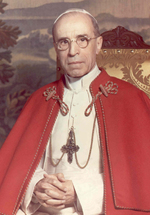Pius XII
| Surname | Parcelli |
| Given Name | Eugenio |
| Born | 2 Mar 1876 |
| Died | 9 Oct 1958 |
| Country | Vatican City |
| Category | Government |
| Gender | Male |
Contributor: C. Peter Chen
ww2dbaseBorn Eugenio Maria Giuseppe Giovanni Pacelli into a powerful Vatican family, Pope Pius XII became the 260th Pope of the Roman Catholic Church on 2 Mar 1939 after a 40-year career with the church. Already well-versed in diplomacy from his experience with the Vatican equivalent of the foreign ministry, including nine years as Cardinal Secretary of State, his papacy was one that was heavily influenced by international politics. Although by no means a proponent of Nazism, he was criticized for his failures to speak out against Nazi atrocities. The first failure came before his papacy when he was accused to persuade his predecessor Pope Pius XI not to speak out against the Nazi Party after Kristallnacht in Nov 1938 where Nazi Party members attacked Jews and destroyed Jewish-owned businesses in Germany and Austria. In 1941, he received Ante Pavelic, leader of a German-sponsored puppet nation in Croatia; though it was a private audience and not a diplomatic one, it reflected Pius XII's personal recognition of the puppet nation that conducted a program that many regarded as genocide. In the same year, when approached by Philippe Pétain of France to determine whether anti-Semitic laws violated church doctrine, Pius XII responded that the church condemned racism but refused to give a specific answer whether anti-Semitic laws forced by Germany upon Vichy France was supported by the church or not. In May 1942, Polish ambassador to the Vatican Kazimierz Papée made a public complaint that the Pope failed to condemn Berlin even though atrocities against the Polish people were made known to the world. Many similar incidences repeated themselves over and over again where the Pope refused to condemn Nazi Germany, insisting that the atrocities against Jews and other groups were rumors, even when respected leaders of the church such as Monsignor Giovanni Battista Montini (future Pope Paul VI) sent words of the Holocaust to the Vatican. While some speculated that he might not have been well informed of the seriousness of the Holocaust, a 1999 study by the International Catholic-Jewish Historical Commission concluded that he was aware of many details of the genocide as early as Jan 1941, based upon the study of correspondences to the pope before and during the war. Despite these failures, he did show support for the monarchs of the Low Countries when they were invaded and helped many European Jews to escape to the Americas and Palestine. Despite refusal to public denounce anti-Semitism, he did also privately communicated with various leaders in Europe to plead them not to obey German demands for deportations of Jews. Overall, his reaction to the Holocaust was inconsistent. "At times, he tried to help the Jews and was successful. But these successes only highlight the amount of influence he might have had, if he not chosen to remain silent on so many other occasions."
ww2dbaseAfter the war, Pius XII advocated to pardon all war criminals. He passed away at Castel Gandolfo in 1958.
ww2dbaseSources: Jewish Virtual Library, Wikipedia.
Last Major Revision: Jul 2006
Photographs
 |  |
Pius XII Timeline
| 2 Mar 1876 | Pius XII was born in Rome, Italy. |
| 2 Mar 1939 | Eugenio Pacelli became the head of the Catholic Church; he took on the papal name Pius XII. |
| 23 Jun 1939 | Pope Pius XII reached an agreement with Brazilian President Getúlio Vargas for Brazil to issue 3,000 visas to allow non-Aryan Catholics, some of whom were Jews recently converted to Catholicism to escape prosecution, to travel to Brazil. Ultimately, however, only under 1,000 visas would be issued. |
| 24 Dec 1939 | Pope Pius XII made a Christmas Eve appeal for peace. |
| 28 Jun 1940 | Pope Pius XII offered to be a mediator for the warring powers. |
| 18 Sep 1942 | Monsignor Montini, future Pope Paul VI, sent a letter to Pope Pius XII, noting that "the massacres of the Jews reach frightening proportions and forms". |
| 3 Jan 1943 | President Wladyslaw Raczkiewicz of the Polish government-in-exile in London, England, United Kingdom urged Pope Pius XII to denounce German atrocities against the Jews. |
| 1 Sep 1943 | Pope Pius XII, in a broadcast to the world, made an appeal for peace. |
| 18 Mar 1945 | Pope Pius XII denounced Nazi German racist policies. |
| 1 Oct 1945 | Pope Pius XII met with Thomas Dodd between 1050 hours and 1130 hours; part of that time was spent discussion the trials of German leaders. |
| 9 Oct 1958 | Pius XII passed away. |
Please consider supporting us on Patreon. Even $1 per month will go a long way! Thank you. Please help us spread the word: Stay updated with WW2DB: |

» Mit Brennender Sorge
» No. 128-133: King Léopold III's Appeal for Peace and Responses
» No. 139-142: Appeal for Peace by Pope Pius XII
» Reichskonkordat
Related Books:
» A Special Mission
» The Pope and Mussolini
- » 1,178 biographies
- » 337 events
- » 45,081 timeline entries
- » 1,245 ships
- » 350 aircraft models
- » 207 vehicle models
- » 376 weapon models
- » 123 historical documents
- » 261 facilities
- » 470 book reviews
- » 28,491 photos
- » 365 maps
Thomas Dodd, late 1945